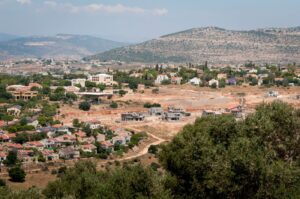The heart of “new urbanism,” though not always expressed this way, is the claim that human beings are better off if they can perform their daily activities without the necessity and complexity of artificial transportation. But while new urbanists are clear about what they want, the philosophical foundations for this way of life are murky, and there is little more justification than controversial environmental and aesthetic benefits and a gesture towards the ideal of “community.”
The response to such arguments has been swift and to the point. People like having larger yards, fresh air, and separation from their neighbors. Commute times have not drastically increased; we are simply driving faster. And claims about the environmental impact of suburban development are deeply controversial, as are claims about what sort of human development represents “beautiful architecture.” The white picket fences of the new urbanist town of Celebration, built by the Disney Company, are “charming” to some and nothing more than tacky kitsch to others.
Philip Bess, director of graduate studies at the University of Notre Dame School of Architecture, is deeply sympathetic to the ideals of new urbanism and has been trying for some years to give it a more substantive philosophical foundation. His argument, rooted in the philosophy of Aristotle and Thomas Aquinas, draws on scholars such as Alasdair MacIntyre and Philip Rieff. Here’s what I see as the main thread of his argument, constructed in a collection of essays recently published under the title Till We Have Built Jerusalem.
First, we are by nature social animals. Second, the most important human goods are the moral and intellectual virtues: courage, temperance, justice, prudence, wisdom, and the like. Third, the communities that make virtuous action possible and so make happiness possible include families, churches, schools, voluntary associations, and many other organizations that share a common purpose and whose members are therefore together pursuing common goods. Finally, the most important overall human community is the city itself, a community of communities, whose purpose is to shelter the various smaller communities and make possible the discovery, pursuit, and achievement of our complete human good, happiness itself.
Given how we pursue and achieve happiness, and that our built environment can encourage or discourage the activities necessary for human happiness, we must promote building patterns that will help these various small-scale human communities to flourish and make virtuous action possible. But the architecture of community, the architecture that will best promote successful small human communities organized within one large civic community, is the architecture of new urbanism. Therefore, as Aquinas might have said, the natural law requires that we make mixed-use, walkable human settlements.
Start your day with Public Discourse
Sign up and get our daily essays sent straight to your inbox.But, one might respond, we do see the value of community life, and we pursue it, and the larger civic community, with its built environment of streets, highways, subdivisions, and so on, does help make this possible. Here is Bess:
A neighborhood contains within walkable proximity to one another places to live, work, play, learn, and worship. . . . A suburb may have places to live, work, play, learn, and worship; the point is that these activities are confined to single-use zones that are typically distant from one another and require access by car through a pedestrian-hostile environment.
But why is that bad? If suburbia, after all, provides all those different communities, why does suburban sprawl inhibit the genuine community life necessary for happiness? Why should we think that the careful Aristotelian and Thomistic philosophical account of human flourishing requires walkable communities?
I’m going to offer three arguments in favor of Bess’s conclusions, and which together, I think, give us a powerful defense of new urbanism. The foundation for these three arguments consists in what is surely the most striking difference between the various communities in the walkable neighborhood and the various communities in the suburbs: the communities of the neighborhood typically overlap, whereas the communities of the suburb do not. Though suburbanites still live, work, play, worship, and shop, there will be very few people, if any, with whom they will have more than one activity in common. We live with people other than those with whom we work, and we pray with yet a third, different community.
The most important feature of contemporary suburban sprawl, then, has little to do with aesthetics and everything to do with its fragmenting character. Suburbia makes possible and promotes a division between the various individual activities that make up our lives. But while our activities seem fragmented, we must find a way to integrate the various activities in which we engage so that our lives are a harmonious and unified whole. The task of integration, of recognizing the various human goods and pursuing them as a single human agent in search of happiness, is the central task of human life. And it is in terms of an integrated pursuit of the final end that each of the moral and intellectual virtues finds its place.
My first argument is the following: We need others in order to identify what is good for us. For Aquinas, practical deliberation, or consilium, “properly implies a conference among several” (Summa Theologiae I-II.14.2). Because there are too many potentially relevant considerations for us to go through alone, because we might always make mistakes, and because properly human goods are always common goods and so require us to learn from others what we could not know on our own, practical deliberation is, as such, a human activity that must take place in community.
Now we can see a problem with suburbia and its various communities, isolated from one another. Typically, we have no companions who share all the various parts of our lives, but if we require the counsel of others in order to integrate these different aspects, we will need help from those who, alongside us, are a part of all the different activities that we must integrate.
For example, we typically do not think that co-workers will offer helpful advice as we try to integrate work with the demands of household and church. Nor do we think that family members will be very helpful in integrating the household with the demands of work. The reason, of course, is that no one else understands all the various demands placed on us, the hierarchy between those demands, or how best to avoid destructive conflict between them. We do sometimes think that we can get advice from others after we have explained the situation to them, but, of course, exactly what we need is the perspective of someone else, independent of ourselves, who participates with us in the same activities and so can bring a fresh and different perspective to bear on our struggles. Exactly what we can’t imagine is someone offering us substantive and helpful advice before we have explained the situation to them, precisely because no one is in the position to know the situation unless we tell them.
On the other hand, if all our daily activities were within walking distance, many people would share several, and perhaps some even all, of the various common activities of which we are a part. New urbanism, then, is required by the natural law because it makes possible necessary social deliberation about the integration of our life as a whole.
Here is my second argument for thinking that the natural law requires walkable human communities: true virtuous action demands that we treat others justly, charitably, and with kindness. But it’s not sufficient for me, when I perform a virtuous action, to know that what I do is just in this particular context. Many actions will be just or charitable or kind when considered in abstraction from their wider context (so donating an enormous sum to my church might be charitable on its face, but the fact that I robbed my bank in order to do so makes it vicious); true virtue achieves the good in terms of the final end, the broadest context possible. For Aquinas, being prudent in this particular context might be nothing more than mere cleverness; it is only when I successfully order my pursuit of this good here and now into the overall pursuit of the final good that I can be called truly prudent. In order, therefore, to know whether or not I am acting virtuously towards others, I must know whether or not I am promoting the achievement of their final end. That is, I must understand how my particular act here and now fits into their life as a whole, and whether or not it promotes, in the end, their happiness.
This should be perfectly familiar to all of us: We do not, as a rule, know how to treat beggars that approach us in the street. How could we possibly know if this particular person does, in fact, need assistance from us? Either we ignore him, perhaps thinking that this particular beggar is, through cowardice or weakness, avoiding the sustained effort of real life, or we try to help him, hoping that what we are doing really does help him, but of course without knowing whether or not this is true. In the end, it might even be best as a general rule to always try to help those who ask for help; my point is merely that this will not be truly virtuous action, not because it is vicious, but because we do not know what must be done here and now, and are instead simply making a guess.
The features of this example tend, I think, to characterize much of our so-called virtuous action today. We act for what appears good in a very narrow context, without really knowing (or having any practical way of knowing) if our actions truly are good.
My third argument is this: When our lives are fragmented in the way suburbia makes possible, it is much easier for us to act badly, and it is much harder to learn from the bad actions we do perform (and so to become someone who eventually acts well). It becomes much easier for us to treat someone poorly, to violate the demands of true virtue, when that person shares only a small fragment of our lives. It is much easier to be impolite or rude or impatient or uncharitable when the object of our actions is someone we see only now and again, or perhaps hardly ever.
For similar reasons, it is much harder to learn from the bad actions we do perform, since we are rarely forced to confront the consequences of our actions. The development of virtue requires that we confront what is difficult and learn from it, and the primary difficulty we must face is our own failure to pursue what is good. But suburbia makes it altogether too easy to avoid the consequences of our bad behavior, and so makes learning from our mistakes much harder. Why should I struggle to achieve the courage necessary to apologize to my neighbor when I hardly ever see my neighbor? There is an obvious reason that the family is the most immediate crucible of virtue: you cannot avoid these people, and for that reason you had better treat them well, and if you don’t, you had better apologize as soon as possible. For the same reason, new urbanism promotes the development and practice of virtue.
Nevertheless, these three arguments in defense of new urbanism also remind us just how difficult the new urbanist project is. If the most basic reason we need new urbanism is that we need to integrate our lives with the help of others, whom we, in turn, help to integrate their lives, and both activities are made more likely if we cannot isolate our failures and their consequences from the rest of our life, then we face an obvious obstacle. It looks like all this is only possible if enough people agree on the end, the general shape of human happiness as a whole, and this agreement on what matters most shapes and makes possible all the other integrative activities of our community. But what if we no longer agree on this (and, frankly, this seems exactly the situation we face today)? Bess reminds us that suburbia represents a turning away from public life towards private life. Front porches have become back decks, and public squares have disappeared. Suppose we were to rebuild those public squares, and all of us spent our evenings on our front porches. We might discover, to our dismay, that we had almost nothing to talk about.











